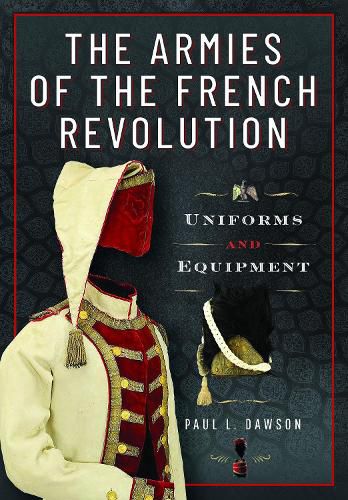Readings Newsletter
Become a Readings Member to make your shopping experience even easier.
Sign in or sign up for free!
You’re not far away from qualifying for FREE standard shipping within Australia
You’ve qualified for FREE standard shipping within Australia
The cart is loading…






The Revolutionary period was marked by upheaval for France and its army. The early Republic's military comprised former Royal Army members and revolutionary volunteers, reflecting diversity in their uniforms. Despite the chaos, records were meticulously maintained, and Paul L. Dawson examined thousands of documents from the Service Historique Armee du Terre in Paris to detail the uniforms worn before Napoleon's rise. Soldiers' clothing followed strict regulations, with each item assigned a specific lifespan. Regular inspections assessed uniform conditions, and unserviceable items were returned and replaced. Repairs were logged, and soldiers bore the costs of replacements. A regiment's clothing officer managed equipment purchases for enlisted men, while officers supplied their own uniforms. The regimental council ensured purchases met quality standards, recorded in a Register of Uniforms. Inspection returns and registers provide unprecedented insights into Revolutionary army uniforms, much of which was previously unpublished. Though not all regiments' data were found, Dawson's research offers the most accurate depiction to date. His book combines detailed records with illustrations and photographs of rare surviving items, giving readers a unique visual and historical perspective on soldiers' appearances during this transformative era. AUTHOR: Paul L. Dawson BSc Hons M. Res MIFA FINS has had a lifelong passion for archaeology and history, holding both a degree in archaeology, and a master's degree in history. Over the last twenty-five years he has written almost fifty books, primarily on the period 1660 to 1831, exploring the relationship between political and religious dissent with the state, equine nutrition and biomechanics, as well as the history of his home city of Wakefield in West Yorkshire. Perhaps he is best known for his series of ground-breaking books on the Waterloo Campaign of 1815 and his studies of the uniforms and equipment of the French army 1792-1815. Outside of writing and research, he is a gifted equestrian, riding for film and TV, as well as competing dressage and teaching classical equitation. In his free time, he is a church musician ? both organist, choir director and solo singer ? and lay minister with the General Assembly of Unitarians and Free Christians. Following a severe traumatic brain injury, resulting in speech, cognition and some mobility issues, he is a campaigner for disability rights for others recovering from brain injury. 200 colour illustrations
$9.00 standard shipping within Australia
FREE standard shipping within Australia for orders over $100.00
Express & International shipping calculated at checkout
The Revolutionary period was marked by upheaval for France and its army. The early Republic's military comprised former Royal Army members and revolutionary volunteers, reflecting diversity in their uniforms. Despite the chaos, records were meticulously maintained, and Paul L. Dawson examined thousands of documents from the Service Historique Armee du Terre in Paris to detail the uniforms worn before Napoleon's rise. Soldiers' clothing followed strict regulations, with each item assigned a specific lifespan. Regular inspections assessed uniform conditions, and unserviceable items were returned and replaced. Repairs were logged, and soldiers bore the costs of replacements. A regiment's clothing officer managed equipment purchases for enlisted men, while officers supplied their own uniforms. The regimental council ensured purchases met quality standards, recorded in a Register of Uniforms. Inspection returns and registers provide unprecedented insights into Revolutionary army uniforms, much of which was previously unpublished. Though not all regiments' data were found, Dawson's research offers the most accurate depiction to date. His book combines detailed records with illustrations and photographs of rare surviving items, giving readers a unique visual and historical perspective on soldiers' appearances during this transformative era. AUTHOR: Paul L. Dawson BSc Hons M. Res MIFA FINS has had a lifelong passion for archaeology and history, holding both a degree in archaeology, and a master's degree in history. Over the last twenty-five years he has written almost fifty books, primarily on the period 1660 to 1831, exploring the relationship between political and religious dissent with the state, equine nutrition and biomechanics, as well as the history of his home city of Wakefield in West Yorkshire. Perhaps he is best known for his series of ground-breaking books on the Waterloo Campaign of 1815 and his studies of the uniforms and equipment of the French army 1792-1815. Outside of writing and research, he is a gifted equestrian, riding for film and TV, as well as competing dressage and teaching classical equitation. In his free time, he is a church musician ? both organist, choir director and solo singer ? and lay minister with the General Assembly of Unitarians and Free Christians. Following a severe traumatic brain injury, resulting in speech, cognition and some mobility issues, he is a campaigner for disability rights for others recovering from brain injury. 200 colour illustrations